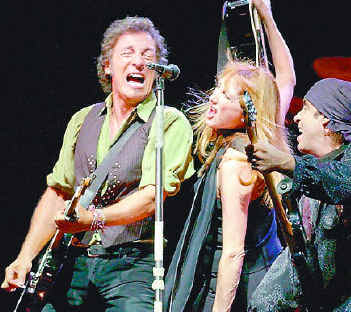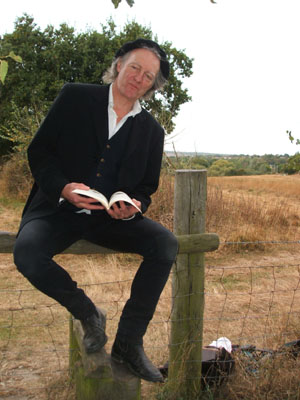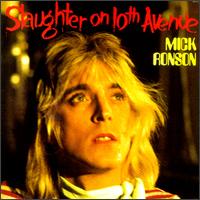
I took a spin with a friend in his vintage 1980 Camaro Z28 — chromewheelfuelinjectedandheadingoutovertheline — the other day with an advance of Magic, The Boss’ new-and-about-to-drop album with the E-Street Band, in the back pocket of my best ripped jeans. “Radio Nowhere”, which sounds too close to Tommy Tutone mining one of Graham Parker’s 3rd-rate music industry rants for comfort, was no great shakes. The next song, “You’ll Be Comin’ Down”, was pretty cool. It’s anthemic but very poppy. I could see my girlfriend digging this one. And then there was The Big Man! Where’s this guy been all these years? What’s The Boss been doing keeping him relegated to tambourine. I got no beef with Patti and Little Steven, but we’re talkin’ The Big Man, Boss. Good to hear him wail again.
The Boss, “Livin’ in the Future”
And does The Big Man ever wail on “Livin’ in the Future”! “10th Avenue Freeze Out!” I yelled, and my buddy floored it. I like the way The Boss drops the “g” in song titles with gerunds and spells ‘em as he says ‘em. We almost got a speeding ticket for this one. (Which reminds me of that line from The Departed, where Matt Damon gets transferred into plainclothes and offers to help his State Trooper buddy get transferred to plainclothes as well. “You got any other clothes, or do you like coming to work looking like you just invaded Poland,” he says.) I haven’t been listening to The Boss’ albums closely for some time, but I haven’t heard The Big Man step forward and blow his patented scale like this in years. Damn, the song even features that heavy-handed tambourine, the glockenspiel, the Farfisa organ, and a “nah-nah-nah” chorus of Iwo Jima proportions. The Boss may not be healing the nation this time, but it was clear he’s back with a vengeance.
I wish it were still summer, because this album would sound real good at the shore. Man, I’d like to have “Gypsy Biker” playing in my head while I take in the girls on the Boardwalk. The Boss rips off one of those twangy Telecaster solos in this song, you know, the kind that make you wish he’d solo more often, the kind where he sets the body of the guitar on his right thigh, points the neck out to the crowd, then squats and grimaces. Remember when he put out those first two albums without the E-Street Band, when he was married to the soap opera chick and had some chunky guy with a bandana tied around his thigh playing guitar with him? I hated that shit.
I’ve also never warmed up to The Boss in his Hobo of the People mode, which began with Nebraska. I remember reading about that album when it came out and thinking it would be cool to hear The Boss recording his music on a 4-track. Then this same buddy played me the album, and fuck those mumbling, State Trooper/John Steinbeck odes! The Boss, to me, was all about rising above, rallying the troops, partying – but not too hard, no heavy drugs and shit. If a couple of beers won’t do you, you ain’t goin’ nowhere, you know what I mean?
The Boss, “Your Own Worst Enemy”
“Your Own Worst Enemy” features what I think critics call “plaintive strings.” This is a pretty song, especially so for The Boss. It sounds like something The Jayhawks might have done. (Man, they were a great band that never got their due.) But you know what’s cool about this song? As you’re bopping along, gettin’ horny thinkin’ about your girl, he’s holding a mirror right up to your face! This is The Boss at his best: lulling you into a false sense of security, and then shoving that spoonful of medicine down your throat. You’ll think twice before you vote Republican again!
“Girls in Their Summer Clothes” also features a lighter, prettier sound than we’ve ever heard from The Boss. He’s always had that Phil Spector Wall of Sound going for him, but the wall has never been so detailed and polished. You know what else is cool about this song? The Boss sings really low, but he doesn’t growl or do any of that Woody Guthrie stuff. He almost sounds like that Righteous Brothers guy, you know, the one who would sing in Dirty Dancing. This is the kind of song I could imagine The Boss wanting to record when he was a Jersey kid in high school, listening to his transistor radio, fighting with his Dad at the breakfast table before heading off to school.
“I’ll Work for Love” sounds like the kind of Springsteen song that Steve Earle hears in his head when he’s rocking out in a Boss-like manner. Very catchy. I’m telling you, this album’s going to explode if it can hang on the charts until next summer!
The title track, “Magic”, is the first time he falls into his Hobo voice to any extent, but even this song has some pop polish, like one of the last singles on Born in the USA. It’s not all faux-Dustbowl sounding, if you know what I mean.
“Last to Die” is his fiery anti-war song. For a second I thought an Arcade Fire song accidentally slipped onto the album. The song is about as obvious as The Boss gets, but if it brings the troops home one day sooner, I’m cool with it.
The album mellows out a bit too much for my tastes toward the end, but it’s cool. The Boss even slips into his Fragile Hobo voice on “Devil’s Arcade”, possibly as a shoutout to his young friend, that Bright Eyes guy. Again, there’s a bit of that Arcade Fire majesty to the arrangement. A bonus track called “Terry’s Song” wraps it up in a stripped down manner that would make his age-appropriate buddy, Jackson Browne, proud.
It’s been a long time since I believed in magic, but if The Boss must record another album, this is the album I want to hear. I still believe, man, I still believe.




